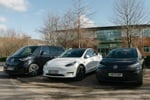Small dealerships are hesitant about EVs — but shouldn’t risk getting left behind, according to James Hosking, managing director of AA Cars
The motoring landscape is changing, with more EVs appearing on the market and sales steadily rising. But any used car dealerships that believe they have time on their side when it comes to selling EVs risk being left behind.
One in six new cars hitting the road last year were EVs, while battery-powered vehicles accounted for a record 1.8% of sales in the used car market in Q3 2023.
With an influx of new models entering the market, drivers have greater choice than ever before. This is not confined to the new car market either. The number of used EVs listed on the AA Cars site has surged by a fifth (19%) since 2019. More options for drivers will play a big part in further increasing second-hand EV sales.
As expanding selection and falling prices accelerate EV adoption, small dealerships reluctant to make EVs part of their inventory risk being left behind in this fast-moving era. However, there are some barriers to stocking EVs which can pose a challenge to smaller dealerships with tighter margins.
Though the transition requires upfront investment, adapting to the market will distinguish the thriving dealerships from those that risk falling behind.
The barriers to EV adoption
Small dealerships that lack the cash reserves of larger players or franchised dealers will find that the considerable upfront investment required to stock electric vehicles is the most significant barrier.
But more than just acquiring high-priced EV inventory, these businesses must also budget for the infrastructure to support electric vehicles, including installing on-site charging stations.
Yet EVs’ growing market share presents an ideal opportunity for forward-thinking dealerships. By proactively investing in stock and becoming specialists in EVs before demand intensifies, smaller businesses can establish first-mover advantages as consumer adoption accelerates.
Another barrier is a lack of knowledge and familiarity when it comes to the inner workings of an EV. While small dealerships are experts in used petrol and diesel cars, EVs remain an unknown entity for some. With different mechanical components and servicing needs, dealerships need to invest time - and potentially more money - in developing their EV expertise.
Smaller dealerships critical to EV take-up
Yet small dealerships should not underestimate the important role they will play in the uptake of EVs, especially with the 2035 ban on the production of new petrol and diesel cars on the horizon.
These businesses are often embedded within their communities, with customers returning time and time again for their used car needs. AA Cars data reveals that a third (31%) of drivers have bought two or three cars from the same dealership as they return to businesses that they trust.
Small dealerships that stock EVs will help to make ownership more accessible, and increase consumer confidence in electric vehicles.
Small dealerships that provide a more personalised and hands-on experience can help make the transition for drivers easier. This includes listing the benefits, explaining the technology, detailing the overall EV experience, and being better positioned to offer ongoing support after the sale is completed.
Almost half of drivers believe that practical advice from a dealer would simplify the process of buying an EV. AA Cars has launched an Electric Vehicle guide for dealers to help them offer customers the advice they need most when purchasing greener cars.
As major car manufacturers invest billions into electrifying their products and EV adoption targets get closer, small dealerships should consider re-evaluating their position on electric cars. The dealerships that embrace this change can build their reputations as premium showrooms for eco-conscious drivers.
How dealerships can boost their confidence
The most important way for dealerships to gain confidence with electric vehicles is to invest in training for sales staff and in-house mechanics on all aspects of EVs.
Even if this comes a few years before dealerships start stocking electric cars, it is important to get ahead of the game now. After all, even if you don’t stock EVs yet, customers will soon be asking questions about them, and it is important to be able to answer them to retain consumer trust and confidence.
Salespeople should understand EV technology, models, charging, government incentives, and the best ways to pitch these vehicles to sceptical customers. Mechanics need training on safely handling high-voltage systems and properly servicing EV-specific components.
Ongoing industry education is a must as the market rapidly evolves. Dealers should make the most of EV training programs, online courses, and hands-on tutorials for driving an EV. Knowledge is key in building confidence.
The wholesale switch to EVs will not happen overnight, but there will be a turning point in the near future. The dealerships who want to stay ahead of the curve should consider getting their ducks in a row now to avoid being left behind.


















Login to comment
Comments
No comments have been made yet.